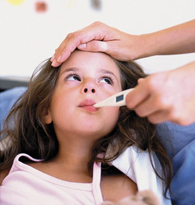When a child develops fever with allergies, it is most likely a result of a secondary infection. It is important to note that allergies will not cause the body temperature of a child to increase. Some of the symptoms of an allergic reaction can cause the build-up of mucus in various parts of the body, resulting to an infection. The most common types of secondary infections among children with allergies include sinus infections, ear infections and bronchitis. A doctor should be consulted for proper assessment in order to determine the exact cause of the fever.
Allergies occur due to the immune system response of the body to a certain substances such as pollen. Take note that an allergic reaction can trigger the manifestation of symptoms that are strikingly similar to common cold but not due to a virus. Fever is quite common among children who develop secondary infections such as sinus infection. Remember that an allergic reaction can cause the sinuses to swell and become inflamed, thus trapping the mucus that encourages the growth of viruses and bacteria.
What are the symptoms?

The symptoms of a child with allergies and a fever might overlap. A child with dust mite allergy might develop severe sinus congestion that can lead to a sinus infection which intensifies the nasal congestion. The common allergy symptoms include sneezing, runny nose, watery eyes, sinus congestion and throat irritation. In case a child has fever with allergies, he/she will also have a body temperature higher than 100.4 degrees F. The child also has other symptoms such as fatigue, body chills and nausea.
Treatment for allergies
It is best to consult the doctor for proper assessment and treatment. The doctor will properly diagnose and recommend the suitable treatment. Allergic reactions can be prevented by identifying the allergens causing the reaction and avoiding them. In addition, the child can be given a daily antihistamine. In case the child develops a chronic allergic condition that results to a consistent fever, the doctor might recommend allergy shots.
Treatment for fever
When treating a fever due to allergies, it is recommended to use a pain medication or fever reducer. Do not provide aspirin to children below 18 years old since it might increase the risk of the child to develop Reye’s syndrome. Other measures to manage the fever include the following:
- Dress the child in loose-fitting clothes
- Give a warm bath
- Provide adequate amount of fluids
It is best to schedule an appointment with a doctor if a child with allergies experiences fever over 105 degrees, has stiff neck, persistent crying, difficulty waking up, difficulty breathing and develop purple-colored spots.
When a child experiences fever during an allergic reaction, it is best to consult a doctor so that proper assessment can be carried out.
